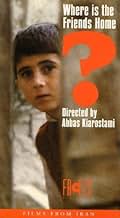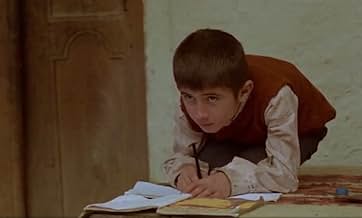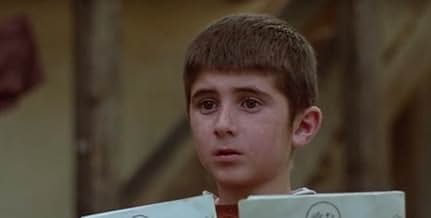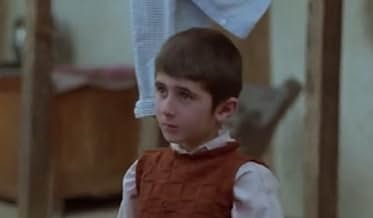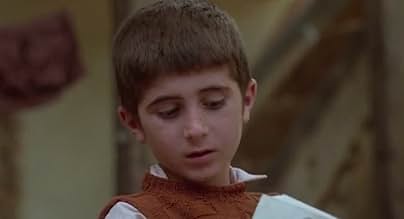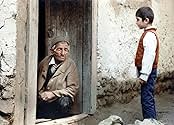IMDb-BEWERTUNG
8,1/10
21.354
IHRE BEWERTUNG
Ein achtjähriger Junge muss das Heft seines Freundes zurückgeben, das er versehentlich eingesteckt hat. Ansonsten wird sein Freund bestraft und der Schule verwiesen.Ein achtjähriger Junge muss das Heft seines Freundes zurückgeben, das er versehentlich eingesteckt hat. Ansonsten wird sein Freund bestraft und der Schule verwiesen.Ein achtjähriger Junge muss das Heft seines Freundes zurückgeben, das er versehentlich eingesteckt hat. Ansonsten wird sein Freund bestraft und der Schule verwiesen.
- Regie
- Drehbuch
- Hauptbesetzung
- Auszeichnungen
- 5 Gewinne & 4 Nominierungen insgesamt
Khodabakhsh Defaei
- Teacher (Moalem)
- (as Kheda Barech Defai)
Empfohlene Bewertungen
A simple, sweet & soul-stirring account of a young boy's quest to do the right thing, Where Is the Friend's House is a gently crafted & sincerely narrated story about the inherent goodness in all of us and through the eyes of its 8-year old protagonist, it covers the themes of morality, conscience, righteousness, determination & everyday heroics while also shedding light on the hypocrisy & beliefs of the adults around him.
Written, directed & edited by Abbas Kiarostami, the film takes a very simple & straightforward premise and formulates an endlessly captivating narrative out of it through scenarios that not only seem credible but also make us all the more invested in the kid's journey & final outcome. Kiarostami keeps the drama as lifelike as possible, neither overstuffing it nor leaving it hollow, and makes sure every single scene is relevant to the plot.
Through the lens of childhood purity & innocence, we notice the indifference of adults as our young protagonist attempts to make them see reason to his dilemma and why it is important for him to right the wrong. And Babak Ahmadpour plays his character to absolute perfection. He gets every emotion, every nuance, every expression right without saying much, his face a landscape of moral conflict that explicitly tells all he's feeling in the moment.
Overall, Where is the Friend's House is a masterwork of simplicity & humanism that takes the smallest of observations to offer a powerfully resonant & profoundly moving statement about our own society. A fascinating slice of everyday life in rural Iran that's steered by Kiarostami's relaxed approach & first-rate craftsmanship and is further elevated by the young actor's top-notch performance, this Persian gem is a must for every film lover & is one of world cinema's finest offerings.
Written, directed & edited by Abbas Kiarostami, the film takes a very simple & straightforward premise and formulates an endlessly captivating narrative out of it through scenarios that not only seem credible but also make us all the more invested in the kid's journey & final outcome. Kiarostami keeps the drama as lifelike as possible, neither overstuffing it nor leaving it hollow, and makes sure every single scene is relevant to the plot.
Through the lens of childhood purity & innocence, we notice the indifference of adults as our young protagonist attempts to make them see reason to his dilemma and why it is important for him to right the wrong. And Babak Ahmadpour plays his character to absolute perfection. He gets every emotion, every nuance, every expression right without saying much, his face a landscape of moral conflict that explicitly tells all he's feeling in the moment.
Overall, Where is the Friend's House is a masterwork of simplicity & humanism that takes the smallest of observations to offer a powerfully resonant & profoundly moving statement about our own society. A fascinating slice of everyday life in rural Iran that's steered by Kiarostami's relaxed approach & first-rate craftsmanship and is further elevated by the young actor's top-notch performance, this Persian gem is a must for every film lover & is one of world cinema's finest offerings.
A magnificent and unforgettable film with prodigious moments where you really wonder how the director did shoot some moments in such an intimate way without being noticed or without making the presence of the camera a problem. It's a poem (to friendship, honesty, childhood, purity) more than a movie.
10cchaoss
Actually it's hard to find any more words to define this masterpiece than the ones in the title of this review. If you are looking for something that would make you feel like you're reading a classic short story rather than watching a film, then this one is right that film. When you watch a film you have the vision, the sound, the effects, the music; almost nothing's left to your imagination and you watch the film effortlessly. Eventually, the story is misted over. On the other hand, in Khane-ye doust kodjast?, Kiarostami with his fascinating simplicity, takes you deep into a world of childish innocence. Everything from acting to cameras, is full of that precious amateur feeling. You actually feel amazed when you see how well Kiarostami managed to get such natural acting from a cast of all non-professional actors. Each character, each scene is tailored with Kiarostami's masterful observations. The film is so purely simple that, for a second, I even wished we didn't even have the music that plays only in two scenes, though I loved it. I personally believe, it really is a piece of art than a film.
10pyotr-3
This dear and simple story is the most wonderful film I have seen this year. The children are non-actors who bring a reality and wonder to this film that is sadly absent from American films, and you will be left in awe by their performances.
The story involves a little boy who must track down his friend to give him a notebook, or his friend may be kicked out of school. All along the way he is blocked from this quest to "do the right thing" but adults who are too stuck on their own silly business to listen to him and offer assistance. Instead of helping this sincere and good child, they do everything imaginable to block him. How very real this situation is, and how refreshing to see adults forced to examine the condescending way they communicate with children. The child Ahmed in this film is a refreshing hero for little boys... so much better than the smart-alleck and spoiled brats offered up in American films. It is a beautiful story, and it is a beautiful experience to sit and take in this magnificent film!
The story involves a little boy who must track down his friend to give him a notebook, or his friend may be kicked out of school. All along the way he is blocked from this quest to "do the right thing" but adults who are too stuck on their own silly business to listen to him and offer assistance. Instead of helping this sincere and good child, they do everything imaginable to block him. How very real this situation is, and how refreshing to see adults forced to examine the condescending way they communicate with children. The child Ahmed in this film is a refreshing hero for little boys... so much better than the smart-alleck and spoiled brats offered up in American films. It is a beautiful story, and it is a beautiful experience to sit and take in this magnificent film!
Abbas Kiarostami is a director from Iran. His movies are not shown in his native country. But elsewhere in the world he is a critically acclaimed director. His output in the 90's has been tremendously acclaimed and he is called the best or the most important director of the 90's.However before that came the beautiful " Where is the friend's home?" in 1987.
This movie is one of the most human movies I have ever seen. The story is quite simple. A little boy keeps forgetting to do his homework in the book and finally he is threatened with dire consequences. His friend has the book and must return it.
But the story has so much warmth and is shown with so much beauty that it is impossible not to like the film. The characters that we see throughout the movie are very nicely drawn out. Ahmed's interactions with the old man at the end are so beautiful and filled with emotion that I am brimming with joy just recalling those moments.
Akira Kurosawa said of his films, " When Satyajit Ray dies I was sad. But Abbas has taken his place"
This movie is one of the most human movies I have ever seen. The story is quite simple. A little boy keeps forgetting to do his homework in the book and finally he is threatened with dire consequences. His friend has the book and must return it.
But the story has so much warmth and is shown with so much beauty that it is impossible not to like the film. The characters that we see throughout the movie are very nicely drawn out. Ahmed's interactions with the old man at the end are so beautiful and filled with emotion that I am brimming with joy just recalling those moments.
Akira Kurosawa said of his films, " When Satyajit Ray dies I was sad. But Abbas has taken his place"
Wusstest du schon
- WissenswertesThere are two documentaries by the director about the making of this film and the aftermath of the earthquake. He finds that the two lead boys, played by the Amapour (or Ahmed Poor) brothers, survived the earthquake.
- Zitate
Grandfather's Friend: What I mean to say is, suppose the kid did nothing wrong. What would you do? What then?
Grandfather: I'd find an excuse and give him a beating every other week. So he wouldn't forget.
- VerbindungenFeatured in Nassereddin Shah, Actor-e Cinema (1992)
Top-Auswahl
Melde dich zum Bewerten an und greife auf die Watchlist für personalisierte Empfehlungen zu.
- How long is Where Is the Friend's House??Powered by Alexa
Details
- Erscheinungsdatum
- Herkunftsland
- Offizieller Standort
- Sprache
- Auch bekannt als
- Where Is the Friend's House?
- Drehorte
- Produktionsfirmen
- Weitere beteiligte Unternehmen bei IMDbPro anzeigen
Box Office
- Weltweiter Bruttoertrag
- 14.413 $
Zu dieser Seite beitragen
Bearbeitung vorschlagen oder fehlenden Inhalt hinzufügen


